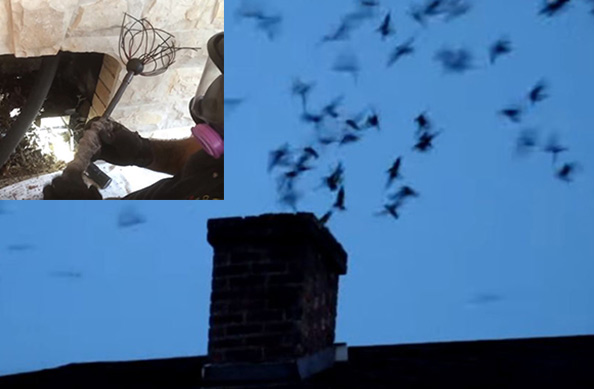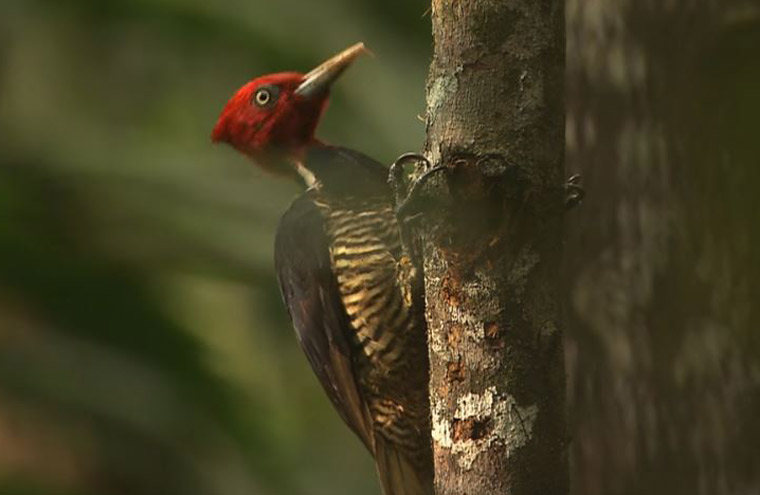-
info@aaanimalcontrol.com
Call us for help in your town
Humane Wildlife Education
Birds in the Chimney - Get Them Out
Need bird removal in your hometown? We service over 500 USA locations! Click here to hire us in your town and check prices - updated for year 2020.
What should I do about birds in my chimney: Birds in chimneys are a common occurrence, which disturbs homeowners to a great extent. You always think that what motivated a bird to enter into the chimney and get lost in the dark there. Frankly speaking different reasons initially are responsible for these kinds of incidents but most commonly it has been noticed that birds, which are normally present on top or rest on chimney tops often enter into the opening in search of food or a proper place for resting however after entering the chimney they find it extremely difficult to get out because it is dark inside the chimneys so after sometime the bird feels trapped and makes desperate attempts for getting out. The condition of bird at that time is extremely miserable because it doesn’t knows what to do and restless attempts to get out only lead to energy loss and fatigue. At the same time you also get disturbed because strange noises come from chimney, but it should be mentioned here that poor creature suffers a lot and is in desperate need of help so you should put in maximum efforts for taking the bird out of chimney. The entire procedure can be complicated as well as troubling so we suggest that you should also master courage and decent level of patience for dealing with such situations because time will be needed.

Before devising any strategy it is important that one should carefully evaluate that birds are not using chimney for making their nests. Many birds find chimneys as decent locations for raising their young ones. Keep in mind the treatment required for dealing with a trapped bird is actually very much different than that which is required for removing the nests. First of all you will have to locate the nest and if there are sounds of babies coming then it is best not to remove the nest because once the young ones will grow up they will leave the nest and fly out on their own. In many states there are laws which forbid harming baby birds plus it is also inhume to disturb them during growth period.
Coming back towards the birds that get trapped we will have to design a special plan and try to be calm, but quick because chances are high that bird may get exhaust and die because of too much activity and restlessness.
Sign
- A bird that will get stuck inside chimney is going to make different kinds of sounds like scratching, chirping, rustling etc. It will want to get out because of this reason such noises will be commonly heard.
- In cases where flues are not close, birds falling into fireplace can also be seen.
- In case of nests with baby birds in it audible chirping sounds will be produced because the young ones will be calling their mother.
- A very strong indicator for birds stuck in chimney is the emission of bad odor from chimneys which in some extreme situations comes from dead body which is decaying.
The dangers
- Birds inside chimneys lead to harmful situations for residents. Those who have made nests inside the chimney are going to leave fecal matter towards chimney’s base and this can lead to causing histoplasmosis.
- Birds are also known for carrying different kinds of secondary pest like mites, ticks etc. and they can affect humans bringing many health related issues.
How to help the trapped bird
- Birds find it extremely difficult to fly upwards especially pigeon face many issues because they are heavy. Normal preference of the bird is to move towards light so the best strategy is that fire place should be emptied and after this shine a torch light so that the bird can get attracted towards it.
- However, if the bird is still shy to fly down, then try to locate the bird and if it appears closer you can use a grabber and gently remove the bird.
- In case you are hearing noises related with presence of bird in chimney then it is better that you should not light fire because it can even kill the bird.
- Once you are successful in taking the bird out of chimney, then we advise that it should be handled with great care. Give it a gentle treatment and after sometime when it is stable leave it in open so that it can fly. Giving food and something to drink is also going to help a lot.
It is strongly suggested that homeowners who don't have enough experience must avoid getting into these situations. You should better call wildlife control services or other experts for helping you with the matter. Chances are high that you are going to harm the bird because of inexperience so it is strongly suggested that a careful approach should be adopted because chimney as well as bird both should not be harmed in any sense. There are different laws which vary from state to state while dealing with birds so you should better consider reading them. The approach should always be humane because being living beings birds also deserve a proper treatment and they should not be exposed to any kind of pain.
Learn more about How to Get Birds Out of Your Chimney on the how to get rid of birds page.
What Kind of Damage Can Woodpeckers Cause?
Need bird removal in your hometown? We service over 500 USA locations! Click here to hire us in your town and check prices- updated for year 2020.
Before we start talking about the bad points of woodpeckers, we feel we should start by first telling you of all the good things the humble (yet noisy) bird offers us. And not just us, wildlife and the ecosystem around us.

When woodpeckers peck away at tress, they aren't actually causing it that much damage. If anything, the woodpecker is doing the tree a good deed, removing an insect problem before it has time to materialize into a destructible problem. The bird generally drills into trees to get to the insects that are hiding within it, but also to get to the sap locked in the bark too.
Most woodpeckers don't actually have a preference when it comes to trees, although they do seem to like those that offer a sweeter sap, or even a bark that is softer than others. Most woodpeckers drill a few holes and then move on, but rarely a group of the birds can come together and destroy a tree to the point where nutrients are no longer able to make their way around it. This is a very rare occurrence, however, and woodpeckers usually only cause problems when they drill into residential and commercial properties.
If the woodpeckers in your garden are not drilling into your home, don't panic too much. There are repellents you can put in place to try and encourage the birds to move elsewhere, if you'd rather they didn't set up residence in the trees on your land. Anything that makes loud noises is generally considered to be a good bird deterrent move, and shiny objects, such as old CDs, reflect the light to confuse the birds, also scaring them away. You can also try creating a physical barrier between the bird and the wood, such as burlap wrapped around trees, or even some kind of bird aversion fluid. The latter is designed to affect the sense on a bird that is similar to the sense of smell in a human. Essentially, the fluid smells bad enough to drive the bird away.
If the woodpecker is drilling into your home, and being damn noisy about it at the same time, it's time to take action. You can repair any damage done by the bird, although, if you have caught the problem early enough this damage should be quite limited. Most people have problems with wooden buildings and constructions, such as summer or winter houses, that aren't inhabited regularly.
Why do woodpeckers peck on houses?
Need bird removal in your hometown? We service over 500 USA locations! Click here to hire us in your town and check prices- updated for year 2020.
It seems like an odd thing to do — banging your head repeatedly against a wooden structure — but it's something the woodpecker does on a regular basis. When this is out “in the wild,” there are no problems, but sometimes these flying, pecking birds find themselves in residential spots, and when they do, the wood pecking noise can be somewhat of a grievance. If you have a woodpecker pecking on your house, it won't be long before you want it gone.

If you have wooden siding on your home, the woodpecker may be confused. It might think that the wood is the same as what is found on the trees, and when it pecks on those other trees — the real ones — the bird manages to find some sap. Of course, it won't find any sap on the side of your home, but it won't know that, and it is likely to persist for quite a long time before it finally gives up.
Sap isn't the only reason why a woodpecker would peck, on wood and on the side of your home. There are often insects found in trees, and the birds feed on these happily. Again, the woodpecker might just be a little confused.
Sometimes woodpeckers will drum their beaks to mark their territories. The bird could very well be doing this when it is pecking on your house, but it could also be calling to a mate. The pecking action is commonly used as a communicative tool, as well as a food-finding one.
If your home is not made out of wood, it could be for communicative reasons that the woodpecker is pecking. It will because the surface helps the sound to resonate far and wide, and this helps the bird to call for others of its kind, particularly over long distances.


















